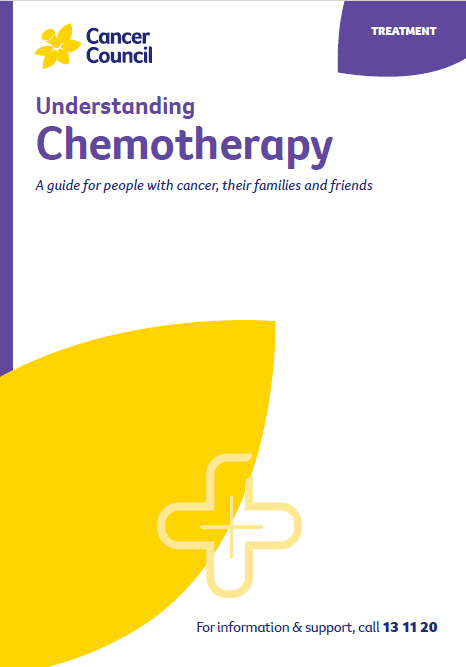- Home
- Testicular cancer
- Treatment
- Chemotherapy
Chemotherapy for testicular cancer
Chemotherapy uses drugs to kill or slow the growth of cancer cells while doing the least possible damage to healthy cells.
Learn more about:
- When is chemotherapy used?
- Having chemotherapy
- Side effects of chemotherapy
- Video: What is chemotherapy?
When is chemotherapy used?
Chemotherapy may be used at different stages of testicular cancer.
| To reduce the risk of recurrence | If you have early testicular cancer that has not spread (stage 1), instead of active surveillance you may be offered chemotherapy after surgery. This is called adjuvant chemotherapy. Your doctor will discuss whether active surveillance or adjuvant chemotherapy is appropriate for you. Adjuvant chemotherapy usually consists of 1–2 cycles. You will then be monitored with check-ups and tests for 5–10 years (active surveillance). |
| To treat cancer that has spread | If you have stage 2 or 3 testicular cancer, chemotherapy may be recommended after surgery to destroy any cancer cells that have spread. This usually involves 3–4 cycles of chemotherapy. Your doctor will discuss the treatment plan with you. Depending on how you respond to the treatment, you may need more surgery or chemotherapy. You will then have active surveillance for 5–10 years. |
| Before surgery (neoadjuvant) | Rarely, when the cancer has spread to other parts of the body, chemotherapy may be given before surgery (orchidectomy) to help control the spread and reduce symptoms. |
| Treatment after chemotherapy | You may need further surgery to remove any tumours that haven’t completely disappeared after chemotherapy. These lumps are called residual masses and they are most commonly found in the lymph nodes in the abdomen. Surgery to remove these lymph nodes is called a retroperitoneal lymph node dissection (RPLND). |
Having chemotherapy
There are many types of chemotherapy drugs. Some people are given a drug called carboplatin, which is often used for early-stage seminoma cancer after surgery. Other drugs commonly used for both seminoma and non-seminoma testicular cancer are bleomycin, etoposide and cisplatin. These 3 drugs used together are called BEP chemotherapy.
Generally, chemotherapy is given through a drip inserted into a vein (intravenously). Bleomycin may also be given by injection into a muscle (intramuscularly). Chemotherapy is commonly given as a period of treatment followed by a break. This is called a cycle. The length of the cycle depends on the drugs used.
The number of chemotherapy cycles you have will depend on the type and stage of the cancer. Your medical oncologist will explain your treatment schedule. Usually, you have chemotherapy during day visits to a hospital or treatment centre. For some types of chemotherapy, you may need to attend hospital several days in a row.
For more on this, see Chemotherapy.
Side effects of chemotherapy
Everyone reacts differently to chemotherapy. Some people don’t experience any side effects, while others have a few. Side effects are usually temporary, and there are medicines that can help reduce your discomfort. Talk to your doctor or nurse about any side effects you have and ways to manage them.
It’s common to feel tired, have nausea or vomiting, lose some hair from your body and head, have erection problems, bowel issues, tingling in the hands and feet, and ringing in the ears. Learn ways to manage some potential side effects that could arise after treatment for testicular cancer.
Chemotherapy can also affect your fertility and, in the long term, increase the risk of heart disease and developing a second cancer.
About a week after a treatment session, your white blood cell levels may drop, making you more likely to get infections. If you feel unwell or have a temperature of 38°C or higher, call your treatment team or go to a nearby hospital emergency department. Before chemotherapy, you may have injections to boost your immunity and protect you from infection.
→ READ MORE: Radiation therapy for testicular cancer
The chemotherapy made me feel tired and left a funny taste in my mouth. These side effects passed quickly, and it helped to drink a lot of water.
Bradley
Video: What is chemotherapy?
Learn more about chemotherapy in this short video.
Podcast: Brain Fog and Cancer
Listen to more episodes from our podcast for people affected by cancer
More resources
Dr Benjamin Thomas, Urological Surgeon, The Royal Melbourne Hospital and The University of Melbourne, VIC; A/Prof Ben Tran, Genitourinary Medical Oncologist, Peter MacCallum Cancer Centre, Walter and Eliza Hall Institute of Medical Research and The University of Melbourne, VIC; Dr Nari Ahmadi, Urologist and Urological Cancer Surgeon, Chris O’Brien Lifehouse, NSW; Helen Anderson, Genitourinary Cancer Nurse Navigator, Gold Coast University Hospital, QLD; Anita Cox, Youth Cancer – Cancer Nurse Coordinator, Gold Coast University Hospital, QLD; Dr Tom Ferguson, Medical Oncologist, Fiona Stanley Hospital, WA; Dr Leily Gholam Rezaei, Radiation Oncologist, Chris O’Brien Lifehouse and Royal Prince Alfred Hospital, NSW; Dheeraj Jain, Consumer; Amanda Maple, 13 11 20 Consultant, Cancer Council SA; Jessica Medd, Senior Clinical Psychologist, Department of Urology, Concord Repatriation General Hospital and Headway Health, NSW.
View the Cancer Council NSW editorial policy.
View all publications or call 13 11 20 for free printed copies.

